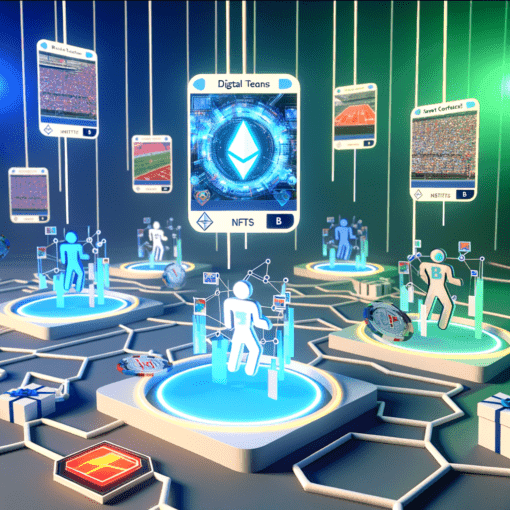Introduction
The convergence of blockchain technology and fantasy sports is setting the stage for a new era in digital gaming and asset management. Fantasy sports have long been a popular pastime, allowing fans to engage with their favorite sports by managing virtual teams composed of real players. With the advent of blockchain, these platforms are evolving to offer decentralized experiences where players can trade assets, participate in tournaments, and receive rewards distributed through smart contracts. This fusion offers not only enhanced security and transparency but also reshapes how value and ownership are perceived in the virtual sports arena.
Blockchain-based fantasy sports platforms are disrupting traditional models by introducing decentralized asset ownership and verifiable transactions. As we delve into this emerging landscape, we’ll explore the innovation potential, market disruption, key challenges, and unique opportunities for startups. We’ll also examine critical strategies for success, supported by real-world examples and industry insights.
The Innovation Potential of Blockchain-Based Fantasy Sports
Decentralization and Transparency
At the heart of blockchain technology is decentralization—a system where no single entity has control over the network. In the context of fantasy sports, this translates to platforms where rules, transactions, and game outcomes are governed by code rather than a central authority. Every transaction and action is recorded on a public ledger, visible to all participants. This transparency builds trust among users, as outcomes and transactions cannot be tampered with or manipulated by any single party.
Decentralization also reduces the risks associated with centralized servers, such as data breaches or server downtime, ensuring that the platform remains robust and reliable. Users can engage with confidence, knowing that the integrity of the game is maintained by the network itself.
Enhanced Security and Trust
Security is a paramount concern in online gaming and transactions. Blockchain employs cryptographic techniques to secure data and transactions. Each block of data is linked to the previous one, creating an immutable chain that is exceedingly difficult to alter retroactively. For fantasy sports platforms, this means player data, transaction histories, and asset ownership records are secure from hacking and fraud.
By eliminating the need for intermediaries, blockchain reduces the points of vulnerability within the system. Smart contracts—self-executing contracts with the terms directly written into code—automate transactions based on predefined conditions. This automation not only streamlines processes but also minimizes the potential for human error or malicious interference.
Smart Contracts and Automated Payouts
One of the most compelling features of blockchain technology is the ability to utilize smart contracts. In fantasy sports, smart contracts can automatically distribute rewards and payouts when certain conditions are met, such as the completion of a tournament or achievement of specific in-game milestones. This automation ensures timely and accurate payouts, enhancing user satisfaction.
Moreover, smart contracts can enforce rules and regulations within the platform, ensuring fair play. They can manage the issuance and transfer of tokens, enforce trading limits, and handle dispute resolutions. By embedding these functions into the platform’s code, startups can provide a seamless and trustworthy experience for users.
Market Disruption and Unique Opportunities
Changing the Dynamics of Asset Trading in Fantasy Sports
Traditional fantasy sports platforms typically limit players to managing virtual assets within the confines of the game, with little to no real-world value. Blockchain disrupts this model by introducing tokenized assets—digital representations of assets that have tangible value and can be freely traded on decentralized marketplaces.
For example, digital cards representing athletes can be issued as NFTs, each with unique identifiers and attributes. These NFTs can appreciate in value based on the athlete’s real-world performance, rarity, or demand among users. Players can buy, sell, or trade these assets, creating a vibrant secondary market and new opportunities for investment and profit.
This shift empowers users with true ownership of their digital assets. Unlike traditional platforms where assets are locked within the game, blockchain-based assets exist independently on the blockchain, giving users control over their use

